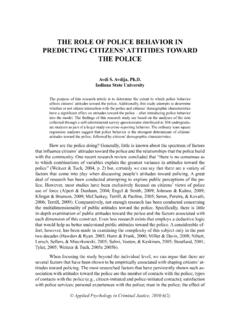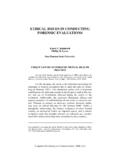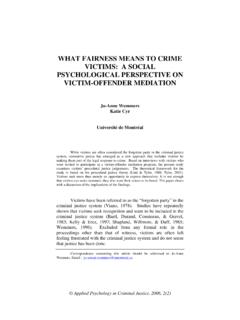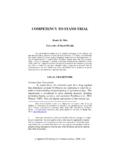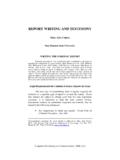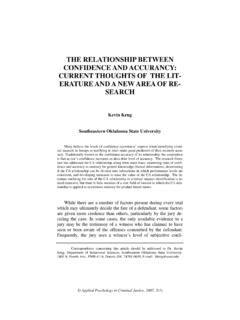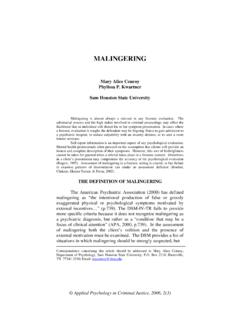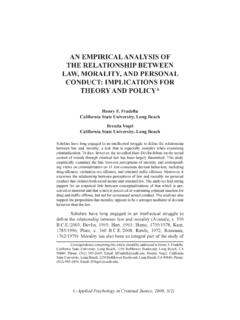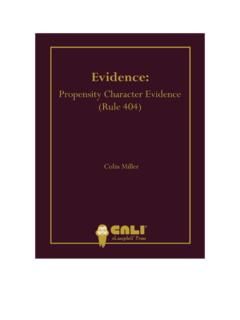Transcription of Special Issues in Juvenile Justice - APCJ
1 Special Issues IN Juvenile . Justice . Keith R. Cruise LSUHSC Juvenile Justice Program From the original Juvenile court founded in Cook County, Illinois, to current Juvenile court systems across the United States, the philosophy of Juvenile Justice has reflected society's predominant views on youth and adolescence. The first Juvenile courts developed during the industrial revolution when social reformers were concerned about the dangers children faced in the workplace. In the early 1900s, compulsory education was promoted as a mechanism to improve the status of poor and immigrant children as well as a tool of social control (Steinberg, 2002). G. Stanley Hall had defined the boundaries of adolescence and described the ensuing storm and stress as a universal experience of all youth.
2 Under the doctrine of parens patriae, Juvenile court systems were developed with the primary goal of rehabilitating wayward youth. The Supreme Court fundamentally changed the nation's Juvenile courts in two landmark cases: Kent v. United States (1966). and In re Gault (1967). The majority opinions in Kent and Gault questioned the rehabilitative focus of Juvenile courts and established children as persons under the Constitution by extending a few, yet fundamental, due process rights to youth. During the 1980s and early 1990s, the nation became increasingly alarmed at rising Juvenile crime rates (Sheley & Wright, 1998;. Snyder & Sickmund, 1999). In response, Juvenile courts turned further away from the restorative doctrine of parens patriae and rehabilitation, and toward enhancing community safety and punishing chronic and violent Juvenile offenders.
3 For example, statutory provisions lowering the maximum age of Juvenile court jurisdictions, increasing use of determinant sentences, and codifying procedures to waive juveniles to adult court became common. Correspondence concerning this article should be addressed to Keith R. Cruise, , MLS, Assistant Clinical Professor of Public Health, LSUHSC Juvenile Justice Program, Bridge City Center for Youth, 3225 River Road, Bridge City, LA 70094; Email: Applied Psychology in Criminal Justice , 2006, 2(3). 178 Juvenile Justice . Similar to those in other states, the Texas Juvenile Justice Code is a mixture of rehabilitative goals and punishment. Reflecting the rehabilitative origins, Texas Juvenile courts do not hold trials but have adjudication hearings (Tex.)
4 Fam. Code . ). Juvenile offenders are not sentenced but receive a disposition (Tex. Fam. Code ). Adjudication does not culminate in a finding of legal guilt or innocence; instead the Juvenile court judge or jury determines whether a child engaged in delinquent conduct indicating a need for supervision (Tex. Fam. Code ). Juvenile court proceedings parallel adult criminal court in many ways. At the adjudication hearing, the child receives notice of the allegations and possible consequences of the proceeding; has the right to trial and to confront witnesses; the right to representation by an attorney; and right to trial by jury (Tex. Fam. Code ). Evidence introduced at the adjudication hearing is governed by the Texas Rules of Evidence and Code of Criminal Procedure.
5 Reflecting the trend toward protecting public safety by establishing punitive consequences, the code also includes provisions to identify violent or habitual offenders (Tex. Fam. Code ) and to waive exclusive Juvenile court jurisdiction allowing for transfer to adult court (Tex. Fam. Code ). Statutory Definitions It is extremely important for forensic evaluators to have a thorough understanding of relevant statutes found in the Texas Family Code, since they will encounter a set of legal definitions specific to the Juvenile Justice system. Child is defined as a person between ages 10 and 17. years of age, or a person currently 17, but not yet 18, alleged or found to have engaged in some type of delinquent conduct before age 17 (Tex.)
6 Fam. Code . (2). Delinquent conduct is defined as conduct that violates a penal law or conduct that indicates a need for supervision (Tex. Fam. Code ). Applied Psychology in Criminal Justice , 2006, 2(3). CRUISE 179. Status offender means a child who is accused, adjudicated, or determined responsible for conduct that would not be a crime if committed by an adult, including such acts as truancy, running away from home, or curfew violations (Tex. Fam. Code . (15)). Mental illness is referenced in Tex. Fam. Code and statutorily defined in Tex. Health and Safety Code In this statute, mental illness refers to an illness, disease, or condition, other than epilepsy, senility, alcoholism, or mental deficiency that: (a).
7 Substantially impairs a person's thought, perception of reality, emotional process, or judgment; or (b) grossly impairs behavior as demonstrated by recent disturbed behavior.. Although very specific terms are used statutorily to define a Juvenile 's status, the Juvenile court has broad authority to order mental health examinations. For example, the Juvenile court can order a child to be examined by a physician, psychiatrist, or psychologist at any stage of the Juvenile court proceeding (Tex. Fam. Code ), and may consider the results of such an examination at a disposition hearing (Tex. Fam. Code ). Many statutes specify that a determination of mental illness or mental retardation be conducted.
8 TYPES OF Juvenile COURT EVALUATIONS. Evaluators can be called upon to address many different types of questions in Juvenile court evaluations (Grisso, 1998;. Melton, Petrila, Poythress, & Slobogin, 1997). As with adult forensic evaluations, it is often the case that the relevant statutory authority is used to guide the evaluation process and structure the Juvenile forensic report. Evaluations During the Adjudication Process There are three different types of Juvenile court proceedings prior to or during the adjudication stage when a forensic evaluation can be requested. Applied Psychology in Criminal Justice , 2006, 2(3). 180 Juvenile Justice . Transfer to adult court The first type of proceeding involves discretionary transfer of a Juvenile to criminal court (Tex.)
9 Fam. Code ). This statute sets specific rules linked to the age of the child and the seriousness of the alleged conduct ( , capital or first-degree felony). Evaluations of the youth can be introduced at a discretionary transfer hearing. Unfitness to proceed The second type of proceeding is an unfitness to proceed determination (Tex. Fam. Code ). In this type of proceeding, the Juvenile court will examine whether the child, as a result of mental illness or mental retardation, lacks the capacity to understand the Juvenile court proceedings or the ability to assist in his or her own defense. Lack of responsibility The third type of adjudication proceeding is a lack of responsibility for conduct determination (Tex.
10 Fam. Code . ). In this type of proceeding, the Juvenile court must determine if at the time of the alleged act, the youth, as a result of mental illness or mental retardation, lacked substantial capacity either to appreciate the wrongfulness of the conduct or to conform conduct to the requirements of the law. Evaluations During the Disposition Process Evaluations are often requested as part of the disposition hearing. Tex. Fam. Code allows the Juvenile court to consider written reports by a variety of court personnel and professional consultants at this hearing, and states that a disposition can only be made when the child is in need of rehabilitation or the protection of the public or the child requires that the disposition be made.
